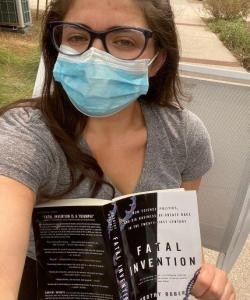This semester the University of Arizona’s College of Medicine’s Office of Diversity, Equity and Inclusion launched the Shared Shelf Book Club, a monthly book club dedicated to justice, inclusion and solidarity in the medical world. The club’s inaugural meeting occurred on Sept. 21, and meetings have been held on the third Monday of each month at 6:30 p.m. via Zoom.
The club was founded by Julie Armin, a faculty member in the Department of Family and Community Medicine and Director of the Health Disparities Curriculum at the College of Medicine.
“The book club is something that’s been on the mind of the Office of Diversity, Equity and Inclusion for a while, but it is part of a broader initiative throughout the College of Medicine to address racism in medicine. So the goal is to really engage in critical and sometimes uncomfortable discussions and build collegiality in the college,” Armin said.
This semester the club tackled a book by Dorothy Roberts titled “Fatal Invention.” The book was broken up into four parts to be read throughout the semester in order to make the book more digestible for the already busy members of the club.
“We try to keep it comfortable so people don’t feel pressure. This isn’t a course – this is enrichment, personal enrichment,” Armin said.
Armin helps facilitate each meeting to encourage meaningful discourse between the diverse perspectives of the group members.
“We have everyone from faculty, both clinical and non-clinical, so physicians and researchers and non-medical undergraduates, medical students, staff. It’s been an interesting mix of people,” Armin said.
Armin described a typical meeting agenda for the Shared Shelf Book Club.
“We asked participants to come with a favorite quote or a quote that was really illustrative for them of Dorothy Roberts’ key message or a quote that really resonated with them, and then we discussed the quotes,” Armin said.
John Lopez is a senior majoring in physiology with minors in English and intercultural studies and a member of the Shared Shelf Book Club.
Lopez said that he enjoyed “being able to reflect on what we talk about in the book and read through the book in our own lives, whether it’s for them as practicing doctors or for me as someone who’s learning about medicine and is an aspiring clinical scientist.”
Lopez joined the club early in the semester after he received an email about it.
“When I saw the name, it was anti-racism in medicine book club. I felt like that really spoke to what I wanted to do and the kinds of discussion and conversations I wanted to have, so I signed up for it,” Lopez said.
Another member of the book club, Jacy Farkas, the Training Director for the Sonoran University Centers for Excellence in Developmental Disabilities in the Department of Family and Community Medicine, described the importance of having access to these perspectives.
“I think most people don’t [know this information]. Particularly if you are going into a healthcare profession, to know where this is coming from and to know the systematic way people have been categorized and then treated within the system is just so important to be able to empathize and understand the populations you’re working with,” Farkas said.
Farkas’ life experiences had a strong connection to the information in this semester’s book.
“There are a lot of things that I didn’t know specifically but were confirmation of things that I kind of know personally or anecdotally as a woman of color,” Farkas said.
Lopez expressed the value in having these types of critical conversations around race in a constructive setting.
“This book club is really important because the sort of conversations around racism are really heavy topics and topics that you don’t normally get handed to you just in your everyday life,” Lopez said.
Lopez said that integrating the knowledge he has learned in the book club into his academic life has given him a whole new understanding of medicine.
“It’s about using science in a responsible way so that we’re not undercutting a lot of the different health disparities that people don’t necessarily have because of genetic reasons but because of different political and socioeconomic issues. So learning that there’s more than just the science side of treating a patient has been really big for me as someone who wants to go into that [field],” Lopez said.
Farkas also described the importance of striving towards this understanding throughout the medical community as a whole.
“I think it’s critical that not only those who teach but are also conducting research have some of this greater understanding,” Farkas said.
Armin said that even though the book club is a part of the College of Medicine, all are welcome to join. If you are interested in joining the Shared Shelf Book Club send an email to diversity@medadmin.arizona.edu.
Lopez also offered some words of encouragement to new prospective members of the club.
“I recommend it. It’s a lot more fun than it sounds, but it’s also even more educational and profound than I could ever make it out to be,” Lopez said.
Follow Tia Stephens on Twitter















